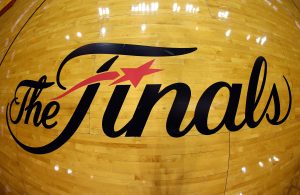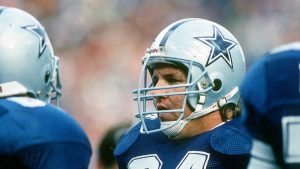Joel Bartilotta offers his favorite strategies for 9-category fantasy leagues and reveals two of his top values to target in the format.
Fantasy basketball managers shouldn’t worry about Malcolm Brogdon’s injury history given how late he goes in drafts and his projected starting role with the Washington Wizards. (Photo by Dustin Satloff/Getty Images)
I’ve been playing on Yahoo for over a decade and play in dozens of leagues every season. I really love to play nine-category head-to-head leagues, which is the format that I thrive in. If you don’t believe me, click here to check out my Yahoo profile.
The rules for this format are simple. You play one opponent every week and compete in nine categories to see who can finish with the best overall record. Those categories include: points scored, rebounds, assists, three-pointers made, field-goal percentage, blocks, steals, free-throw percentage and turnovers.
The perfect week would be 9-0, but that’s nearly impossible because a dominant team will almost always lose turnovers and finish 8-1. You add up these totals in the standings and look to finish as high as possible.
There are a few strategies you can use when playing in 9-Cat formats. It would be simple to sit here and say to play this one or that one, but it all depends on how the rest of your league is drafting and playing out the season. One of the most popular strategies is to punt categories, so let’s go ahead and start there.
[Create or join a Yahoo Fantasy hoops league for the 2024-25 NBA season]
Many fantasy managers like to punt categories and focus on a few to guarantee those each week. The most popular punting strategy is to punt free throws and go heavy on big men. That simply means that you focus on stacking your roster with big men who provide elite value in rebounds, field-goal percentage and blocks, while neglecting your free-throw percentage. Those usually go hand-in-hand since most big men specialize in those statistics while struggling with their free throws. You’ll also likely struggle with assists in that approach, but that’s not my favorite punting strategy.
My favorite way to punt is to not worry about the percentages at all. I love high-volume players who stuff the stat sheet. Getting all of these counting categories is the simplest approach because you can stream every week and try to grab categories on the waiver wire. Some people are so concerned about those shooting averages that they’re unwilling to risk them to stream. Using your max moves every week is critical, especially when you follow the schedule and pick up players who play three games in four nights.
While punting can be profitable, an all-around build is the safest bet. This is where you don’t risk any individual statistics and try to ensure that every player is contributing in each category. The main thing you need to focus on during drafts is that you don’t draft anyone who will hurt any of your percentages. That means you must find big men who shoot above 70% from the free-throw line and guards who can crack 45% from the field. Filling your roster with these efficiency-type players is the easiest way to approach a draft because you can pivot in any direction depending on how the draft plays out.
After playing in these types of leagues for a decade, there are some simple tricks I’ve developed to help gain an advantage over the field.
Streaming: The most impactful thing you can do during the season is to scrounge the waiver wire and stream players every day. Most Yahoo leagues have a weekly limit of four moves, which is why I love to add players in a back-to-back set. It’s shocking to see how that can add up throughout a week, especially when most players are playing just three games per week. If you stream three back-to-backs in a week, it’s almost impossible not to surpass the production of any replacement-level player who has three games. That’s why it’s critical to keep a roster spot open at all times.
Know your opponent: Knowing your opponent’s strengths and weaknesses can be critical in any given week. If you know that someone is punting a category, be sure to take advantage of that. If you have a disadvantage in any category, be sure to stream to put yourself in play for that statistic. You can also look to see if you have more games than your opponent and sit players near the end of the week if you have some of your percentages locked up.
Bench players on Sunday: We just briefly mentioned this in the last section, but benching players is something fantasy managers need to do more. If you have your counting categories locked up and a small lead in percentages, benching players can help you win all of those categories. If you need a bump in field-goal percentage, play the big men and bench the guards. Don’t be afraid to bench your centers if you need to salvage free-throw percentage as well. It feels strange to bench players, but saving any categories at the end of the week could be the difference in the standings at the end of the season.
Grind away, but don’t worry about weekly losses: It’s easy to look at a lousy week and give up, but that’s simply not an option in a 9-Cat head-to-head league. Battling for each category is critical because a handful of games will decide the standings at the end of the season. That’s why limiting the massive 1-8 and 2-7 losses is vital because those can add up and knock you out. Just getting those bad weeks back to a 3-6 or 4-5 can be critical because you will inevitably have some massive weeks.
It’s also important to know that you’ll lose some weeks, but limiting those damages is all that matters since the season is over 20 weeks long. There will inevitably be teams that aren’t as active late in the season, and you can make up for those small deficits when facing those teams in the closing weeks.
After analyzing some strategy tips, let’s talk about some guys who thrive in this format. These are players that don’t hurt you anywhere and are good values based on their ADP.
Fans in Philadelphia would have you convinced that Harris is a below-average option, but his situation with the 76ers just didn’t work for this all-around player. That’s why this move to Detroit is beneficial, as Harris should return to the efficiency we’ve become accustomed to in the past.
Harris has consistently provided a top-50 profile, averaging 17.5 points, 6.4 rebounds, 2.7 assists, 0.8 steals, 0.6 blocks and 1.5 threes over the last 10 seasons. That looks even better when you consider his shot-making, shooting 48.1 percent from the field and 84.3 percent from the free-throw line.
There aren’t many players who provide solid value in all those categories while hurting you in none of them. A bounceback for Harris on this disastrous Detroit roster looks like the most likely outcome, and his ADP has fallen way too far during the offseason.
I like Brogdon for the same reasons as Harris. Brogdon is falling to the end of fantasy basketball drafts because he can’t stay healthy, but that doesn’t matter when you’re selecting him with one of your final picks of the draft. We’re still talking about a player who averaged 17.5 points, 5.6 assists, 4.7 rebounds, 0.7 steals and 1.9 threes over the last five seasons. He also shot 45.4% from the field and 86.4% from the free-throw line during that time.
Brogdon has done most of that damage in a reserve role, but he’s projected to be Washington’s starting point guard during the 2024-25 campaign. That should allow Brogdon to run the show since he’s one of the only true playmakers on this team. While the injury risk is scary, the upside is too high not to take the chance at the end of your draft.










